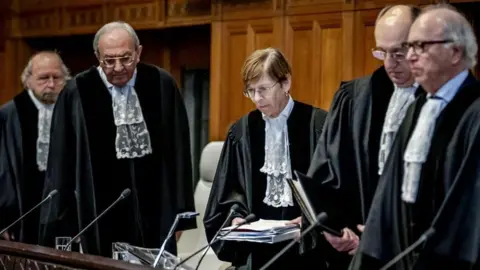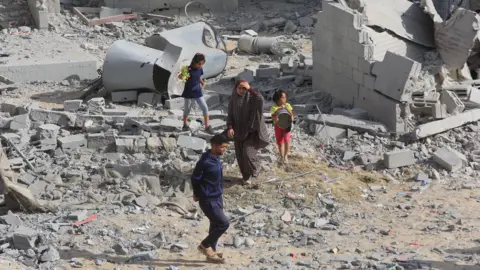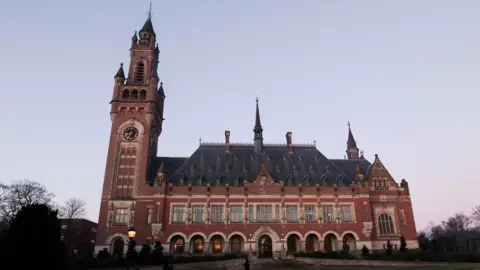Kí ni ìdájọ́ ICJ lórí ẹjọ́ tí South Africa pe tako Israel túmọ̀ sí?
 BBC
BBCIlé ẹjọ́ àjọ ìṣọ̀kan àgbáyé, International Court of Justice (ICJ) ti bẹ̀rẹ̀ ìgbẹ́jọ́ padà lórí ẹ̀sùn tí orílẹ̀ èdè South Africa fi kan pé orílẹ̀ èdè Israel kàn ń pa àwọn ènìyàn danu lásán lórí ogun tó ń wáyé ní Gaza, tí wọ́n sì ní kí ilé ẹjọ́ pàṣẹ fún Israel láti ṣe ìdádúró ìkọlù tó ń wáyé ní Rafah.
Israel ní ẹjọ́ tí South Africa pè tako àwọn kò lẹ́sẹ̀ nílẹ̀ àti pé àwọn máa fèsì lọ́jọ́ Ẹtì.
Ilé ẹjọ́ tó ń gbọ́ ẹjọ́ náà ìyẹn International Court of Justice (ICJ) ni wọ́n ti ń ṣọ́ ọ̀rọ̀ rẹ̀ láti ìgbà tí South Africa ti pe ẹjọ́ náà.
Lóṣù Kìíní ọdún yìí ni ICJ ti kọ́kọ́ gbé ìdájọ́ kan kalẹ̀ – kókó kan pàtàkì tó jẹyọ ni ìwòye ilé ẹjọ́ tó ní ẹ̀rí àtàwọn nǹkan tó rọ̀ mọ́ tó rọ̀ mọ́ ẹjọ́ tí South Africa gbé síwájú àwọn tó ní ẹ̀rí láti fìdí rẹ̀ múlẹ̀ pé àwọn ẹ̀tọ́ tí South Africa ń jà fún ààbò jẹ́ ohun tó ṣe é gbàgbọ́.
Èyí ni ọ̀pọ̀ àwọn ènìyàn tú bó ṣe wù wọ́n, tó fi mọ́ àwọn lámèyítọ́ lẹ́ka ètò òfin, láti fi túmọ̀ pé ilé ẹjọ́ ti pinnu pé ẹ̀sùn tí àwọn kan fi ń kan Israel pé ó ń mọ̀ọ́mọ̀ ṣekúpa àwọn èèyàn lọ́nà àìtọ́ ní Gaza jẹ́ ohun tó ṣe é gbàgbọ́ tàbí jẹ́ òótọ́.
Ìtumọ̀ tí àwọn èèyàn fún ọ̀rọ̀ yìí tàn káàkiri tó bẹ́ẹ̀ gẹ́ tó jáde nínú àtẹ̀jáde àjọ UN, àwọn àjọ tó ń polongo tako Israel àtàwọn iléeṣẹ́ ìròyìn tó fi mọ́ BBC.
Ẹ̀wẹ̀, nígbà tó di oṣù Kẹrin, Joan Donoghue, ààrẹ ilé ẹjọ́ ICJ nígbà náà sọ fún BBC pé ọ̀rọ̀ kò rí bẹ́ẹ̀ àti pé ìdájọ́ kọ́ nìyẹn.
Ó ní dípò bẹ́ẹ̀, ohun tí àwọn fìdí rẹ̀ múlẹ̀ pẹ̀lú ìdájọ́ náà ni àwọn fi sọ pé South Africa ní ẹ̀tọ́ láti gbé ẹjọ́ tako Israel wá sí ilé ẹjọ́ àti pé àwọn èèyàn Palestine ní ẹ̀tọ́ láti dá ààbò bò wọ́n lọ́wọ́ pípa wọ́n lọ́nà àìtọ́ - ẹ̀tọ́ lọ́wọ́ ìjàmbá tí kò lè ṣe é ṣe àtúnṣe sí mọ́.
The judges had stressed they did not need to say for now whether a genocide had occurred but concluded that some of the acts South Africa complained about, if they were proven, could fall under the United Nations’ Convention on Genocide.
Let’s look at the background of the case and how the legal dispute unfolded.
The ICJ was set up to deal with disputes between the nations of the world relating to international law.
That means laws that are agreed between nations, such as the Genocide Convention, a key measure agreed after World War Two to try to prevent such mass slaughter again.
Last December, South Africa launched an attempt at the ICJ to prove that, in its view, Israel was committing genocide in relation to how it was perpetrating the war against Hamas in the Gaza Strip.
It alleged that the way Israel had prosecuted the war was “genocidal in nature” because, according to the South African case, there was an intention to “destroy Palestinians in Gaza”. Israel absolutely rejected these allegations, saying the entire case misrepresented what was happening on the ground.
South Africa would need to show the court clear and hard evidence of an alleged plan to commit genocide. Israel, for its part, would have a right to examine those claims one by one and argue that its actions, in a dreadful urban war, were legitimate self-defence against Hamas, which is designated as a terrorist group by dozens of countries. That full case could take years to prepare and argue.
So South Africa asked the ICJ judges to first issue “provisional measures”.
That’s the ICJ’s term for a court injunction - an order from a judge to freeze a situation, to prevent any harm being done, before a final court finding can be reached.
 Getty Images
Getty ImagesThe court was asked to order Israel to take steps to “protect against further, severe and irreparable harm to the rights of the Palestinian people”.
Over two days lawyers for both countries argued over whether Palestinians in Gaza had rights that the court needs to protect.
The ruling, to which 17 judges contributed (with some of them disagreeing), came on 26 January.
“At this stage of the proceedings, the Court is not called upon to determine definitively whether the rights which South Africa wishes to see protected exist,” said the ICJ.
“It need only decide whether the rights claimed by South Africa, and for which it is seeking protection, are plausible.
“In the Court’s view, the facts and circumstances... are sufficient to conclude that at least some of the rights claimed by South Africa and for which it is seeking protection are plausible.”
Having decided that Palestinians in Gaza had plausible rights under the Genocide convention, it concluded that they were at real risk of irreparable damage - and Israel should take steps to prevent genocide from occurring while these critical issues remain in question.
The court did not rule whether Israel had committed genocide - but did its wording mean that it was convinced there was a risk of that happening? This is where the dispute over what the court actually meant then took off.
In April, some 600 British lawyers including four former Supreme Court justices, signed a letter to the UK Prime Minister, asking him to stop arms sales to Israel and referring to “a plausible risk of genocide”.
 Reuters
ReutersThat triggered a counter-letter from UK Lawyers For Israel (UKLFI). The 1,300-strong group said the ICJ had only ruled that Gaza Palestinians had a plausible right to be protected from genocide - in other words, that it had been dealing with a complex and somewhat abstract legal argument.
The dispute continued in more letters and interpretations.
Many in the first group described UKLFI’s interpretation as “empty wordplay”. The court, they argued, cannot have been solely concerned with an academic question - because the stakes were far higher than that.
And, of all places, the debate crystallised in legal sparring before a UK parliamentary committee, debating the question of arms exports to Israel.
Lord Sumption, a former UK Supreme Court justice, told the committee: “I think it is being suggested [in the UKLFI letter] that all that the ICJ was doing was accepting, as a matter of abstract law, that the inhabitants of Gaza had a right not to be subjected to genocide. I have to say that I regard that proposition as barely arguable.”
Not so, responded Natasha Hausdorff of UK Lawyers for Israel.
“I respectfully insist that reading a finding of plausible risk that Israel is committing genocide disregards the Court’s unambiguous statements,” she replied.
A day later, Joan Donoghue - now retired from the ICJ - appeared on the BBC’s HARDtalk programme and explicitly tried to end the debate by setting out what the court had done.
“It did not decide - and this is something where I'm correcting what's often said in the media... that the claim of genocide was plausible,” said the judge.
“It did emphasise in the order that there was a risk of irreparable harm to the Palestinian right to be protected from genocide. But the shorthand that often appears, which is that there's a plausible case of genocide, isn't what the court decided.”
Whether there is any evidence of such terrible harm is a question the court is far from deciding.
